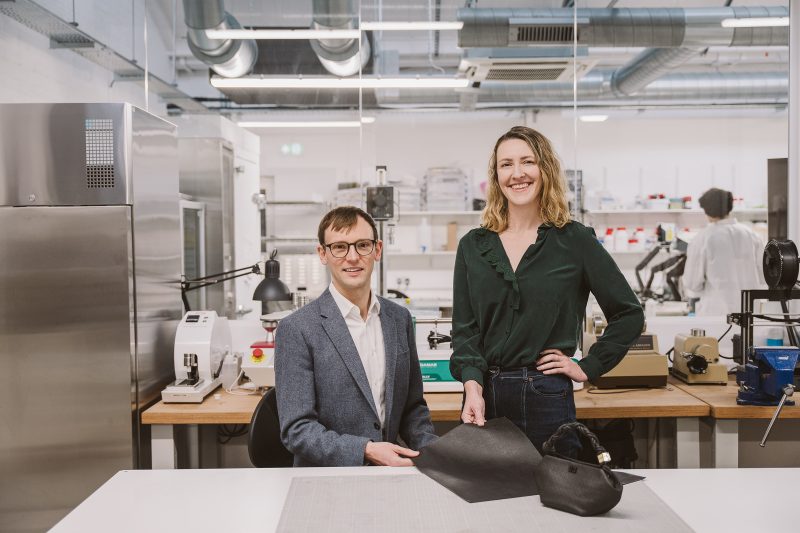Last Updated on: 5th February 2025, 04:40 pm
Leading climate investors are supporting Modern Synthesis’ revolutionary biomaterial technology, which aims to cut emissions and reduce plastic pollution across the fashion, footwear, and automotive industries.
Biotechnology innovator Modern Synthesis has successfully closed an oversubscribed $5.5 million funding round to advance the commercialisation of its microbially-derived biomaterials. The investment round was led by Extantia Capital, with participation from Artesian and Collaborative Fund. This funding will enable the company to expand production at its pilot facility and serve the growing number of fashion brands on its waitlist.
According to industry research, fashion brands striving to meet increasing decarbonisation and climate regulations will face a 133 million tonne shortfall of sustainable raw materials by 2030. Modern Synthesis’ technology offers a solution, allowing brands to adapt their material choices while delivering new textures, aesthetics, and functional benefits.
Modern Synthesis produces its biomaterials by converting nanocellulose—a naturally fermented fibre—into high-performance, durable alternatives to animal leather, ‘vegan’ leather, and plastic-coated textiles. The company’s proprietary, scalable production process capitalises on the innate strength and versatility of nanocellulose, which at the nanofibre level is eight times stronger than steel. These materials are free from petrochemicals and toxic components, providing a significantly lower environmental impact compared to traditional textiles.
Jen Keane, CEO and Co-Founder of Modern Synthesis, commented:
“Having demonstrated unprecedented material performance without plastic, we’re primed to offer the fashion market a material solution that can both captivate consumers and unlock a path to circularity. This investment gives us the capacity to work with more brands as we continue to uncover new use cases for the technology.”
In September 2023, Modern Synthesis debuted a prototype handbag in collaboration with Danish fashion brand GANNI. The companies are now working towards the commercial launch of GANNI’s Bou Bag, which will be crafted using Modern Synthesis’ innovative biomaterial. Despite growing demand for sustainable textiles, they currently represent less than 5% of the $1 trillion global apparel market. With more than 35 new sustainability-linked regulations set to reshape the industry in the coming years, brands that fail to transition to low-impact materials could face significant financial risks, with up to 8% of EBIT potentially at stake, according to a BCG analysis.
Yair Reem, Partner at Extantia Capital, praised Modern Synthesis’ groundbreaking approach:
“The first thing that struck us was how this material rivals traditional leathers in look and feel, but can also offer something entirely new that excites designers. Jen’s deep expertise in fashion and design, combined with Ben’s tech-savvy brilliance, has created a game-changing solution that redefines what’s possible with sustainable, high-performance materials. Modern Synthesis represents the future of industry – delivering better, more cost-effective and resilient materials that also happen to be green.”
Alexandra Clunies-Ross, Partner at Artesian Investments, shared her enthusiasm for the company’s potential:
“We are delighted to partner with Modern Synthesis in their mission to mainstream biobased materials. Our investment decision was driven by the company’s potential to revolutionise traditional manufacturing processes, and drive real impact at scale. At Artesian, we believe that early-stage investment in innovative technology companies like Modern Synthesis is crucial in addressing the climate crisis.”
With backing from leading climate-conscious investors, Modern Synthesis is well-positioned to address the urgent demand for low-impact materials in fashion, while also preparing for future expansion into the footwear and automotive industries.






